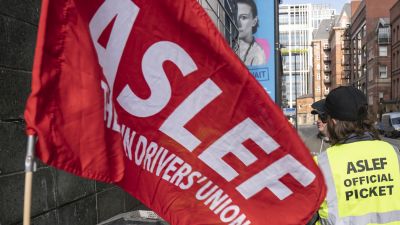New train strikes from end of January by drivers' union Aslef

Fresh strikes have been announced by the train drivers' union Aslef.
Train drivers are to stage a series of fresh strikes and an overtime ban in their long running dispute over pay, causing more travel chaos for passengers.
Members of Aslef will take part in a rolling programme of one-day strikes from January 30 to February 5 and will ban overtime for nine days from January 29.
The union said it wanted to put pressure on “intransigent” train operating companies as well as the “tone-deaf Tory government” to give train drivers their first pay rise in almost five years.
Where will drivers be striking?
January 30: Southeastern, Southern, Gatwick Express, Great Northern, Thameslink, South Western Railway and SWR Island Line
January 31: Northern Trains, Transpennine Express
February 2: Greater Anglia, C2C, LNER
February 3: West Midlands Trains, Avanti West Coast, East Midlands Railway
February 5: Great Western, CrossCountry, Chiltern
Aslef general secretary Mick Whelan said: “We have given the government every opportunity to come to the table but it has now been a year since we had any contact from the Department for Transport. It’s clear they do not want to resolve this dispute.
“Many of our members have not had a single penny increase to their pay for half a decade, during which time inflation has soared and, with it, the cost of living.
“The Tory government has now tried its old trick of changing the rules. When they couldn’t win they brought in minimum service levels legislation."
Whelan added that new law will only deepen the divisions between the two groups and that a realistic pay offer from the government is the only way to settle the dispute.
Number 10 has criticised plans for the fresh strikes, with the PM's spokesman adding: “This is extremely disappointing. Not least to commuters, who have already been so badly hit by Aslef’s decision to continually strike.
“Aslef drivers continue to be paid far above what the average person in the UK receives.
“Rail companies have made a fair and reasonable offer, and we would encourage them to step back from this action.”
The, strikes, which will cripple train services, mainly across England, could be the first test of new regulations aimed at ensuring a minimum level of service during strikes, set at 40% in the transport sector.
Want a quick and expert briefing on the biggest news stories? Listen to our latest podcasts to find out What You Need To Know…